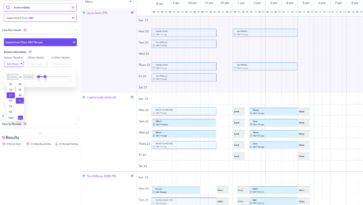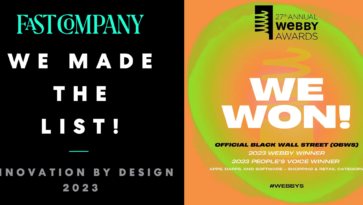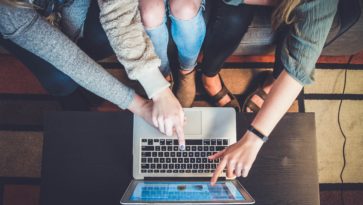Kayla Main is an Associate Product Manager who joined us in March. She’s a deeply empathetic and introspective individual who’s passionate about the education space. To learn more about who she is and what drives her, please read her interview below.
Where did you grow up and what was it like?
I grew up in the suburbs of Los Angeles (Santa Clarita, CA). There wasn’t much to do, so conversing and going to six flags were top forms of entertainment. Definitely a wholesome environment at times with kids playing in culs-de-sac and matching houses, etc.
Outside of work, what are you irrationally passionate about?
I’m extremely passionate about education inequality and animals! I mentor low-access students to help them prepare and get into colleges and universities. I’ve been doing this since I was in high school myself and have always loved helping people overcome barriers to find and reach their educational goals. I am hoping to work with these organizations over time to improve the technology and overall access in this space. I am also passionate about saving local animals and foster kittens when I can.
It’s rather common that PMs have uncommon paths into the discipline. Walk us through the process that you went through to get into Product.
I had no idea what a product manager was in college. I didn’t have access to CS classes in high school, so my technical knowledge was on the lower end. Right out of college, I started working at an energetic tech start up and found my passion for improving systems. I started in operations, but after about 2 months, I started finding and creating the data that had been missing to inform product decisions and continued to recommend products that improved systems at a mass scale until I was eventually embedded into the product team. I hopped into every Product Manager webinar, blog, an event I could get into until transitioning to Sidebench!

We talk a lot about our jobs being the opportunity to imagine the future and then make it real. What vision do you have for the future and want to make real?
Working at Sidebench means a high amount of exposure to different types of companies and products. Being able to accelerate the growth of my product knowledge means I will have the tools I need to start my own projects. I hope to be able to create my own products that help to narrow the education inequality gap by providing the technology needed to connect the right resources to low access students. Eventually, I would love to build a product in the climate tech space that brings the ability to live sustainably to day to day life.
Not everything we do works and that’s okay. We learn from those things. What is the least successful product or project you’ve contributed to and what did you learn? (No need to mention real names if it’s an issue)
In 2020, I worked on a product that had evolved as a need due to COVID-19. While this product was well intentioned, the urgency and small budget of the product meant that the product launched to clients before it was fully usable. This product ended up being a huge time lift for internal employees that likely led to a significant amount of burnout and other downstream effects. This was a great learning lesson to zoom out and see the total effect of a product, rather than being hyper focused on profitability. In this case, this product brought some value to other companies and their users, but ultimately did not consider all users involved enough and caused more frustration than it was worth.
How has a failure, or apparent failure, set you up for later success? Do you have a “favorite failure” of yours?” (Borrowed from Tim Ferris’ “Tribe of Mentors”)
This is a bit cliche, but one of my biggest wake up calls was adjusting to college. After living in a suburban area and being in the top of my class, going to college was the first time that I was consistently not the smartest student in the room. At first, this meant me being too embarrassed to ask for help, leading to a not so great first quarter. But this is eventually what made me genuinely enjoy not being the smartest person as I ultimately learned much more and saw the true geniusness that results from collaboration.

What’s been the most exciting part about joining Sidebench so far?
Definitely have to say the diversity of work is the most exciting opportunity that Sidebench provides. The ability to work on multiple different products at a time or across time is intellectually and creatively stimulating.
We love to find people that ADD to our culture vs fit into our existing culture. What are some cultural aspects that you’ve experienced that you hope to bring with you?
I have always been the type of person who is most productive and motivated when I am deeply connected to my work. I hope to try to add additional value to Sidebench by bringing this connectivity to the projects that I am on and helping everyone on the team feel connected to the purpose of the project. While this is something Sidebench already excels at today at the macro level, I think I can help to bring this into the day to day.
Describe your super power or describe what unique skill/perspective you bring to the team here.
This would probably be my ability to reconsider. I can be an introspective person, often thinking in the background about how to improve myself, problems, or systems around me. As a result, I think I’m able to reconsider assumptions that I have built by simply being curious and listening, and may also challenge assumptions around me if those stop making sense. Being able to recognize this ensures the best ideas win when collaboration is at its best.
What skill, practice, behavior, hobby or habits are you currently working on?
Currently challenging my own assumptions on my abilities by trying to work on two things that I had previously decided I was not good at: piano and language learning. I recently started learning piano as a means to get back into singing and am picking up Farsi, despite my past failures to learn Spanish and Italian.
Bonus Question: What book, publication, or podcast have you most recommended lately and why?
One I would recommend to pretty much anybody is Bill Gates’ book How to Avoid Climate Disaster, especially if you are not already a climate expert and want to learn more. I found this book to be motivational in taking steps on your own to contribute more actively to avoiding climate change, even if you previously hadn’t thought much about sustainability or climate change in the past, and love that the style of the book can appeal to such a broad audience.
You can also find this article on Medium









